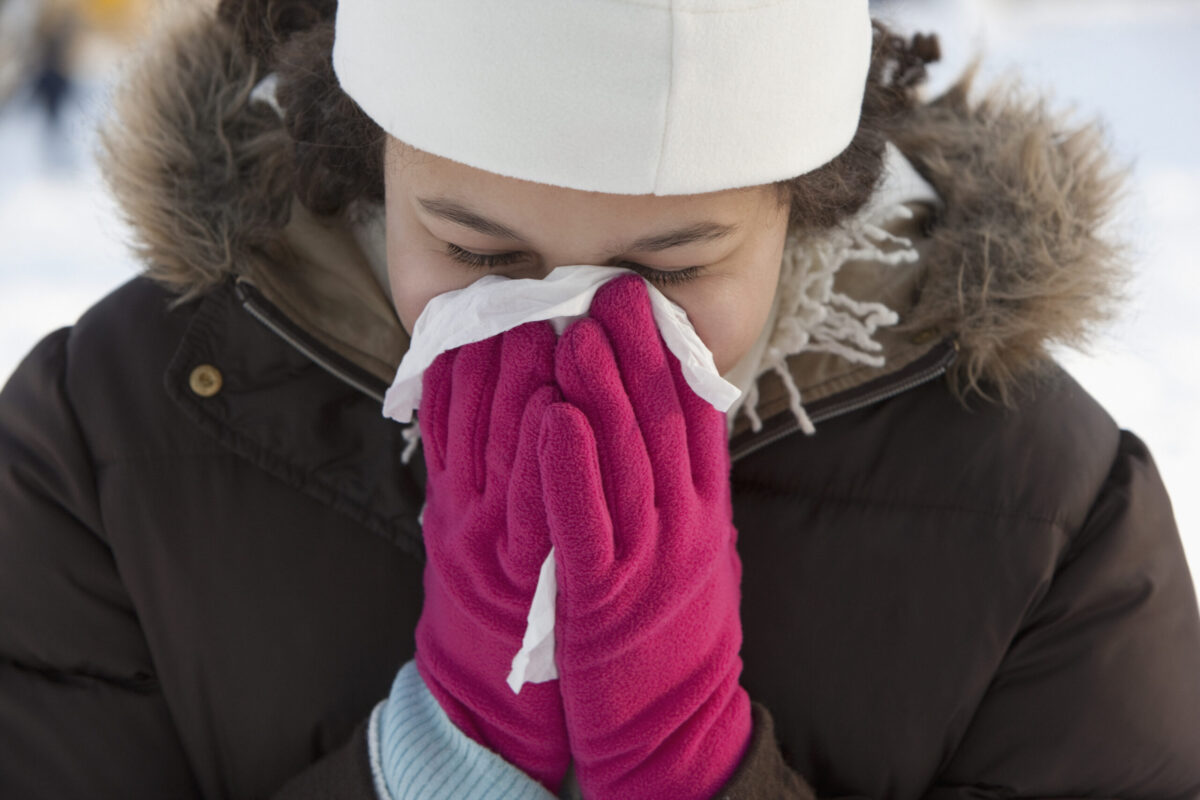Gloves, mittens and scarves are common this time of year in Tennessee. But during COVID-19, are there extra precautions we need to take when it comes to winter weather and gear?
Yes and no, says Dr. Chris Andershock, medical director at BlueCross BlueShield of Tennessee.
“Lower temperatures and lower humidity always create more favorable environments for viral illnesses, and COVID isn’t any different,” says Dr. Andershock. “You’re blowing your nose more, and you’re putting your hands near your face, and that means more particles are being expressed and spread than in warmer months.”
Still, it doesn’t seem that gloves or scarves are the culprit when it comes to increased COVID transmission.
“The virus appears to be more hardy on steel surfaces and hard plastic than softer surfaces like cloth,” says Dr. Andershock. “The biggest thing is being inside around people who’ve been exposed to the virus. That accounts for 70% of all transmissions, so close contact is still our biggest threat.”
In addition to staying home and social distancing, here are a few facts everyone should know.
5 facts about winter hygiene & COVID-19
1. It’s common for people to “give themselves” the virus
“Getting the virus on your hands and ‘giving it to yourself’ is a common way to catch COVID-19,” says Dr. Andershock. “Hand hygiene is really important, and the best way to prevent that.”
Avoid self inoculation:
- Carry a portable hand sanitizer that’s at least 60% alcohol
- Avoid touching hard surfaces in public places
- Wash your hands with soap and water whenever possible
10 facts about handwashing — and how to get it right
2. Scarves aren’t masks
“Scarves are meant to keep the face warm, not provide protection — to you or anyone you’re near,” says Dr. Andershock. “Masks are designed to capture droplets. Most scarves aren’t dense enough to do the job.”
If you forget your mask and a scarf is all you have, it’s better than nothing, but don’t rely on it to protect you or others.
3. Heat kills viruses
“If you’re worried about germs that could be on hats, gloves or scarves between washes, put your clothes in the dryer for 20 minutes on a setting above 130 degrees,” says Dr. Andershock. “That will kill the virus. Ironically, leaving your clothing in your car during the summertime would have done the job for you as it reaches 160 degrees, but that won’t work in winter.”
For items like big coats or hard surfaces, consider:
- Using a portable, high-power UV light wand for 30 seconds
- Spraying them with a homemade disinfectant made from room-temperature water:
- Bleach: Mix 1 quart of water + 4 teaspoons of bleach (not splashless)
- Hydrogen peroxide: Mix 2.5 cups water + .5 cup of hydrogen peroxide (3%)
4. Social distance didn’t come out of nowhere
“The idea of using physical distancing to stop a virus from spreading is actually based on work that was done with influenza,” says Dr. Andershock. “They found that if you can keep a 6-foot radius between yourself and others, transmission rates drop dramatically. And the less time you spend in close contact, the better.”
How to practice social distancing to limit the spread of COVID-19
5. Everyone can take steps to boost their immune system
“One of the best things you can do is to make yourself a hard target for the virus,” says Dr. Andershock. “Getting your immune system ready won’t prevent you from getting COVID, but if you do get it, it could be the difference between a mild and serious case.”
Try:
- Adding immune-boosting vitamins C and D3 to your diet
- Making sure you’re getting enough zinc, which can help with recovery from viral infections
- Getting enough rest
“Rest is very important for a healthy immune system, and it’s something people often overlook,” says Dr. Andershock. “In my opinion, doing what you can to make your body a harsh environment for the virus is as important as wearing a mask.”
WellTuned guide to natural sleep aids
Get more information about specific health terms, topics and conditions to better manage your health on bcbst.com. BlueCross BlueShield of Tennessee members can access wellness-related discounts on fitness products, gym memberships, healthy eating and more through Blue365®. BCBST members can also find tools and resources to help improve health and well-being by logging into BlueAccess and going to the Managing Your Health tab.


